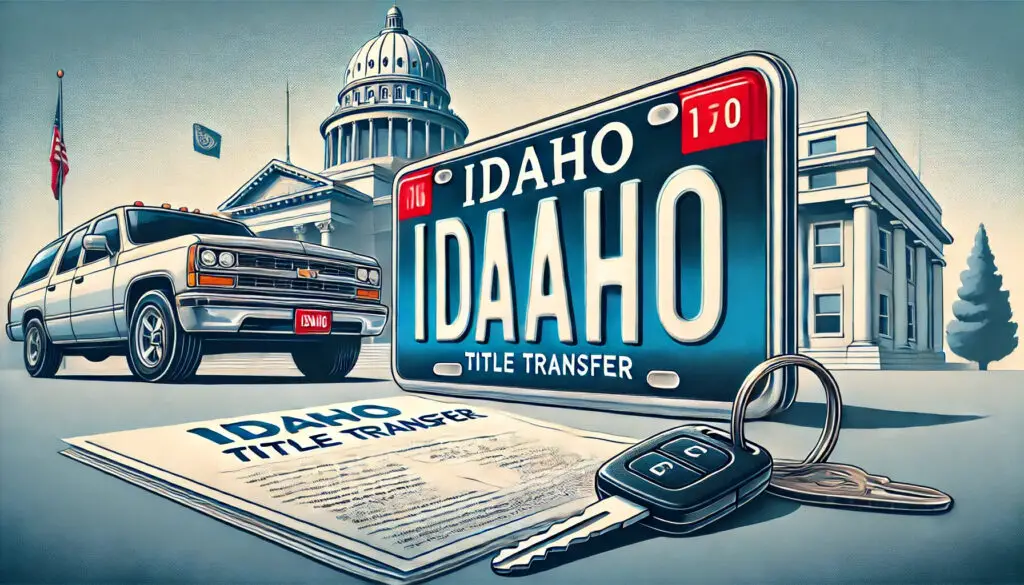Title transfer in Connecticut is a crucial legal process that ensures the proper transfer of ownership for vehicles, property, and other assets. Whether you’re selling a car, buying a home, or transferring a boat, understanding the title transfer process is essential for maintaining clear ownership records and avoiding legal complications. In this comprehensive guide, we will walk you through every step of the title transfer process in Connecticut, covering all aspects from vehicle to real estate title transfers and much more.
What is Title Transfer in Connecticut?
Title transfer refers to the legal process of transferring the ownership of a vehicle, property, or other assets from one individual or entity to another. In Connecticut, this process is mandatory to ensure that the new owner has legal rights to the asset in question. Without completing the title transfer, the new owner would not be able to legally claim ownership, which could lead to disputes or legal issues down the line.
Different Types of Title Transfers in Connecticut
- Vehicle Title Transfers: This applies to the transfer of ownership of a car, truck, motorcycle, or any other type of motor vehicle.
- Real Estate Title Transfers: When buying or selling property, the title must be transferred to reflect the change of ownership.
- Asset Title Transfers: Other items like boats, trailers, and mobile homes also require title transfer when ownership changes.
Why Title Transfer is Essential
Ensuring that a title transfer is completed properly protects both the buyer and the seller. It:
- Meets legal requirements: Certain assets require title transfer to comply with state laws.
- Protects ownership rights: A properly executed title transfer establishes the rightful owner.
- Avoids potential legal issues: Failing to transfer the title properly can lead to disputes over ownership or financial obligations.
Section 1: Understanding the Title Transfer Process in Connecticut
What Does Title Transfer Mean?
Title transfer means changing the registered ownership of an asset, like a vehicle or real estate, from one party to another. For vehicles, this involves transferring the title document from the seller to the buyer, while for real estate, the deed is transferred. The process ensures that the new owner’s name is properly reflected on all official documents related to the asset.
Who Needs to Transfer a Title in Connecticut?
Anyone involved in buying, selling, or inheriting property, vehicles, or other assets in Connecticut must complete a title transfer. This applies to:
- Individuals purchasing or selling a vehicle.
- Property owners transferring real estate through sale or inheritance.
- Businesses or individuals handling various other assets like boats or mobile homes.
Section 2: Types of Title Transfers in Connecticut
Vehicle Title Transfer
When transferring ownership of a vehicle in Connecticut, certain procedures must be followed. The title document must be signed by both the buyer and the seller, and various forms must be completed. The transfer process is crucial for ensuring that the vehicle is legally registered to the new owner.
Real Estate Title Transfer
Transferring real estate titles in Connecticut requires a deed to be recorded in the local land records. This process is typically handled during property sales or as part of an inheritance. It is essential that both the buyer and seller meet all legal requirements, including completing the necessary forms and paying applicable fees.
Title Transfer for Other Assets
Other types of title transfers, such as for boats, trailers, and mobile homes, follow a similar process. These assets require specific forms and documentation, including proof of ownership, registration, and sometimes inspection before the transfer can be completed.
Section 3: The Step-by-Step Title Transfer Process
Title Transfer for Vehicles in Connecticut
To transfer a vehicle title, follow these detailed steps:
- Complete the Title Assignment: The seller must fill out the “Assignment of Title” section on the back of the title document. This includes buyer details, sale price, and odometer reading.
- Gather Required Documents: In addition to the completed title, you’ll need proof of insurance, a bill of sale, and valid identification.
- Visit the DMV: Take all the documents to your local Connecticut DMV office for processing.
- Pay Fees: There are fees for title transfer and vehicle registration that must be paid at the DMV.
- Inspection: If required, the vehicle may need to undergo an inspection.
- Temporary Tag: The DMV will issue a 5-day temporary tag until you receive the official title and registration.
Title Transfer for Real Estate in Connecticut
- Execute the Deed: The deed must be signed by both the seller and the buyer, and it must include details of the property being transferred.
- Record the Deed: Submit the deed to the local town clerk’s office to record the transfer of ownership.
- Pay Transfer Taxes: Real estate title transfers in Connecticut require payment of the state’s conveyance tax.
Title Transfer for Boats and Other Assets
- Complete Title Form: For boats, trailers, and mobile homes, a specific form must be completed.
- Provide Proof of Ownership: Documentation such as a bill of sale or previous title must be provided.
- Submit to DMV: All forms and proof of ownership should be submitted to the Connecticut DMV.
Section 4: Essential Documents for Title Transfer
Documents Needed for Vehicle Title Transfer
- Completed title assignment form
- Proof of insurance
- Bill of sale
- Buyer’s valid ID or Connecticut driver’s license
Documents for Real Estate Title Transfer
- Signed deed
- Proof of property taxes paid
- Conveyance tax forms
Special Considerations for Other Assets
For items like boats, mobile homes, or trailers, you will need:
- The original title or bill of sale
- Proof of registration
- Other relevant documentation as required by the DMV
Section 5: Fees and Costs Associated with Title Transfer
Vehicle Title Transfer Fees in Connecticut
The fee for transferring a vehicle title typically varies based on the type of vehicle and whether or not it is subject to liens. Other costs can include taxes, registration, and inspection fees.
Costs Involved in Real Estate Title Transfers
Real estate title transfers involve several costs:
- Conveyance taxes
- Title search fees
- Legal fees for preparing documents
Additional Costs You May Encounter
Depending on the asset, you may face additional fees, such as notary fees, lien clearance fees, or charges for obtaining duplicate titles.
Section 6: Common Issues in Title Transfer
Lost or Damaged Title: What to Do
If the title has been lost or damaged, it must be replaced before completing the transfer. This can be done by requesting a duplicate title from the Connecticut DMV.
Discrepancies in Title Records
Errors in title documents, such as misspellings or incorrect vehicle identification numbers (VIN), must be corrected before proceeding with the transfer.
Handling Liens or Loans on Titles
Any liens or outstanding loans on the asset must be cleared before the title can be transferred. This may involve contacting the lender to resolve any financial obligations.
Section 7: Title Transfer for Different Ownership Scenarios
Transferring Title for Joint Ownership
When ownership is held jointly, the process of title transfer may involve additional paperwork, including the agreement of all parties involved.
Divorce and Title Transfer
In cases of divorce, the title of shared assets may need to be transferred as part of the settlement agreement. Proper documentation will be required to complete this process.
Title Transfer for Inherited Property or Vehicles
Transferring the title for inherited property or vehicles involves providing proof of death and a valid will or probate court document.
Business Title Transfers
Businesses in Connecticut may need to transfer ownership of assets such as property, vehicles, or equipment. This process typically requires legal documentation and approval.
Section 8: Title Transfer for Out-of-State Residents
Can Non-Residents Transfer Titles in Connecticut?
Yes, out-of-state residents can transfer titles in Connecticut. They must provide the necessary documents and may have to pay specific out-of-state fees.
Special Rules for Non-Residents Transferring Vehicle Titles
Out-of-state residents must complete the title transfer within a specific time frame and may need to provide proof of residency and vehicle inspection.
Section 9: Avoiding Delays and Mistakes in Title Transfer
Common Mistakes in Vehicle Title Transfers
- Failing to sign the title or bill of sale.
- Not submitting the correct proof of insurance.
- Incorrectly listing lienholders on the title.
Errors in Property Title Transfers
- Failing to record the deed promptly.
- Incorrectly calculating conveyance taxes.
- Not obtaining the necessary signatures or documentation.
Tips for a Quick and Efficient Title Transfer
- Gather all necessary documents beforehand.
- Double-check all forms for accuracy.
- Pay fees in full to avoid delays.
Section 10: Legal Aspects of Title Transfer in Connecticut
Connecticut Title Transfer Laws
Title transfer in Connecticut is governed by state laws that ensure all ownership transfers are legal and binding. These laws are enforced by the DMV and local authorities.
Understanding Title Insurance in Property Transfers
Title insurance protects the buyer against defects in the title, such as liens or ownership disputes.
The Role of Notaries in Title Transfers
Notaries often play a key role in validating signatures during title transfers, particularly for real estate transactions.
Section 11: Frequently Asked Questions About Connecticut Title Transfer
- How long does it take to complete a title transfer in Connecticut?
It typically takes 1-2 weeks, depending on the type of asset and whether additional steps are required. - Can I transfer a vehicle title online in Connecticut?
Some vehicle title transfers can be completed online, but in-person visits may still be required for certain documents. - What happens if there are unpaid taxes on the title being transferred?
Unpaid taxes must be resolved before completing the transfer process. - Is a vehicle inspection required for title transfer in Connecticut?
Yes, vehicles must be inspected before they can be legally transferred.
Conclusion
Completing a title transfer in Connecticut requires careful attention to detail and a clear understanding of the necessary steps. Whether you are transferring a vehicle, real estate, or other assets, following the correct procedures will help ensure a smooth and legally compliant transaction. Keep this guide handy as a reference throughout your title transfer process to avoid common pitfalls and ensure the timely transfer of ownership.











